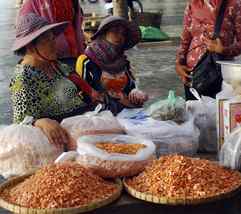 |
| Late Ven. Yoeung Sin (All Photos courtesy of Prey Nokor News) |
 |
| Ven. Yoeung Sin's remain lies in state at Wat Samaki Raingsey Pagoda for his disciples to visit |
កម្មវិធីបុណ្យគឺ ព្រះសង្ឃ សិស្សគណ, ពុទ្ធបរិស័ទ សមាគមខ្មែរក្រោម និងសហព័ន្ធខ្មែរកម្ពុជាក្រោម នៅកម្ពុជា និងបរទេស ប្រារព្ធពិធីបុណ្យបង្សុកូល តាមប្រពៃណី ទំនៀមទម្លាប់ ព្រះពុទ្ធសាសនា ចាប់តាំងពីថ្ងៃទទួលអនិច្ចធម្ម កាលពីថ្ងៃទី ២៨ កញ្ញា រហូតដល់ថ្ងៃទី ២៩ តុលា ឆ្នាំ២០១០ ទើបបូជាព្រះសព នៅវត្តសាមគ្គីរង្សី ភូមិទ្រា សង្កាត់ ស្ទឹងមានជ័យ ខ័ណ្ឌមានជ័យ ក្រុងភ្នំពេញ។
Translated from Khmer by Soy
Click here to read the article in Khmer
- Preah Moha Yoeung Sin (aka Ta Yoeung) was born in the year of the boar, Buddhist Era 2579, 1935 AD
- He was born in Ta Tes village, Ta Keo commune, O’Romol district, Prek Russey province, Kampuchea Krom
- He was the son of the late Yoeung Seen and the late Srey Chim.
- He has four siblings: his older brother Yoeung Sat, his older sister Yoeung Thy Srey Sang, Preah Moha Yoeung Sin and his younger sister Yoeung Thy Yao.
- In 1950, at the age of 15, he studied Khmer language at the Wat Samrong elementary school in Khleang province.
- In 1953, at the age of 18, he took the vow and became a novice monk at Wat Luong Bassac (Bay Chhao) Pagoda, located in My Xuyen commune, Bay Chhao district, Khleang province, Kampuchea Krom. He continued his religious Dharma classes at Wat Prasat Kong Pagoda, Kampong Dong (Tham Don in Vietnamese) commune, Bay Chhao district (My Xuyen in Vietnamese), Khleang province, Kampuchea Krom.
- In 1955, he was ordained senior monk (Bikkhu) at Wat Luong Bassac (Bay Chhao) under the tutelage of Venerable Lim Ben.
- Between 1955 and 1956, he pursued his religious study at Wat Samrong, Khleang province.
- Between 1956 and 1959, he resided at Wat Khnor Dambong Pagoda, located at Cheung Prey district, Kampong Cham province, Cambodia. He also served the Khmer Serey (Free Khmer, anti-communist movement) movement under the cooperation with Mr. Khemarin.
- Between 1960 and 1967, he resided at Wat Luong Bassac Bay Chhao. He remained a Khmer Serey activist, and he also led anti-Ngo Din Diem regime activities (KI-Media Note: Jean Baptiste Ngô Đình Diệm was the first South Vietnamese president. His rule proved authoritarian, elitist, nepotistic, and corrupt. A Catholic, Diệm pursued policies that rankled and oppressed the Republic's Montagnard natives and its Buddhist majority. Source: Wikipedia). Ven. Yoeung Sin was charged with arguing against the South Vietnamese government for people who were conscripted into the South Vietnamese army.
- In 1967, he left religion to pursue a one-year stint in the Thieu-Ky (Nguyen Van Thieu, Nguyen Cao Ky) government as a rural region administrator.
- In 1969, he joined the special force (MIKE Force?) and was trained in Long Hay and Nha Trang.
- In 1970, following the coup d’état in Cambodia [that toppled then-Prince Sihanouk], he was sent to work in Cambodia by the Khmer Serey movement to provide liaison with the remnant of the Khmer Issarak movement (Free Khmer movement which started as an anti-French colonialism movement).
- In 1974, he left Cambodia and returned to Bay Chhao district, Khleang province, Kampuchea Krom.
- Between 1974 and 1976, he acted at the deputy chairman of the (Khmer Krom) Buddhist Association in Khleang province following the retirement of Venerable Moha Dinh Prach.
- Between 16 February 1976 and 25 November 1979, he was jailed in the Prek Russei prison after he was accused of attempting to topple the Vietnamese communist regime within his Khmer Krom movement. (At that time, he was in charge of the movement activities in Bay Chhao district – which included the communes of Prasat Bakong, Boeung Tonsa, as well as numerous other communes and villages. However, the movement failed and numerous Khmer Krom groups were killed and arrested by the communist Vietnamese regime. Those who were jailed were sent to forced labor camps and suffered long-lasting trauma from torture imposed on the prisoners). Ven. Yoeung Sin saw his health deteriorated during his internment and he never fully recovered since then.
- Between 1979 and 1984, following his release from jail, he reunited with his family, and he was nominated as a pagoda layman for Wat Botum Por Krom and Wat Pothivong Leu pagodas, located in Kampong village, Preah Bat Choan Chum commune, Kirivong district, Takeo province, Cambodia. He resided in Takeo province, Cambodia, during that time and he was also nominated as the Tonloap market chairman.
- Between 1984 and 1986, he was sent to jail in Takeo after he was accused of leading Khmer Serey activities. (He was arrested on 14 March 1984 following the connivance between the Vietnamese and Khmer communist regimes.)
- In 1987, he retook the vow at Wat Unalom under the tutelage of Venerables Sum Chhum, Sar Mieng and Pek Phang.
- Between 1993 and 28 September 2010, he was the President of the Khmer Krom Monks Association in Cambodia, an association which he initiated on 13 July 1993.
- Between 02 July 1997 and 28 September 2010, he was the Abbot of Wat Samaki Raingsey pagoda, located in Trea 3 village, Stung Meanchey commune, Meanchey district, Phnom Penh city.
- In 2006, he was nominated as Preah Obachheay (Senior monk) by Ven. Loh Lay.
- Ven. Yoeng Sin was the founder of Wat Samaki Raingsey Pagoda which is currently building its 2-story temple. The roof of the temple is still to be completed.
- On the 5th day of the waning moon of the month of Photrabot, the year of the Tiger, Buddhist Era 2554 (28 September 2010), at 12:15PM, Preah Moha Yoeung Sin passed away after a bout of asthma attack at the age of 75.

























